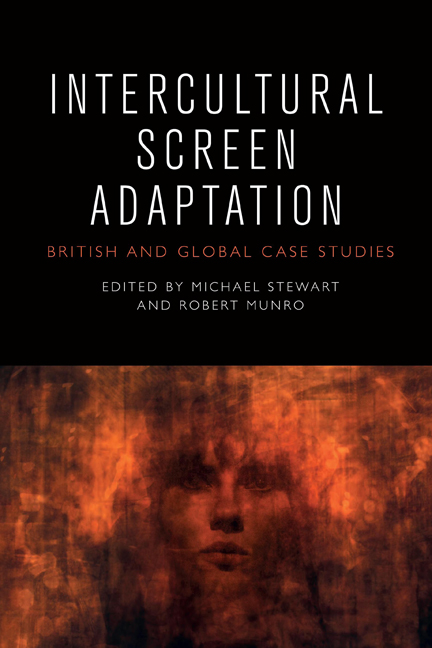Book contents
- Frontmatter
- Contents
- List of Illustrations
- Acknowledgements
- List of Contributors
- Introduction
- PART I NOSTALGIA, HERITAGE AND THE TOURIST GAZE
- 1 Adapting Pagnol and Provence
- 2 ‘A Tourist in Your Own Youth’: Spatialised Nostalgia in T2: Trainspotting
- 3 ‘200 Miles Outside London’: The Tourist Gaze of Far from the Madding Crowd
- PART II RADICAL CONTINGENCIES: NEGLECTED FIGURES AND TEXTS
- 4 Reframing Performance: The British New Wave on Stage and Screen
- 5 Why We Do Not Adapt Jean Rhys
- PART III RE-ENVISIONING THE NATIONAL IMAGINARY
- 6 ‘To see oursels as ithers see us’: Textual, Individual and National Other-selves in Under the Skin
- 7 Back to the Future: Recalcitrance and Fidelity in Julieta
- PART IV THE LOCAL, THE GLOBAL AND THE COSMOPOLITAN
- 8 El Patrón Del Mal: A National Adaptation and Narcos Precedent
- 9 Constructing Nationhood in a Transnational Context: BBC’s 2016 War and Peace
- 10 The Beautiful Lie: Radical Recalibration and Nationhood
- PART V REMAKING, TRANSLATING: DIALOGUES ACROSS BORDERS
- 11 In Another Time and Place: Translating Gothic Romance in The Handmaiden
- 12 Chains of Adaptation: From D’entre les morts to Vertigo, La Jetée and Twelve Monkeys
- 13 A ‘Double Take’ on the Nation(al) in the Dutch-Flemish Monolingual Film Remake
- Index
10 - The Beautiful Lie: Radical Recalibration and Nationhood
Published online by Cambridge University Press: 22 September 2020
- Frontmatter
- Contents
- List of Illustrations
- Acknowledgements
- List of Contributors
- Introduction
- PART I NOSTALGIA, HERITAGE AND THE TOURIST GAZE
- 1 Adapting Pagnol and Provence
- 2 ‘A Tourist in Your Own Youth’: Spatialised Nostalgia in T2: Trainspotting
- 3 ‘200 Miles Outside London’: The Tourist Gaze of Far from the Madding Crowd
- PART II RADICAL CONTINGENCIES: NEGLECTED FIGURES AND TEXTS
- 4 Reframing Performance: The British New Wave on Stage and Screen
- 5 Why We Do Not Adapt Jean Rhys
- PART III RE-ENVISIONING THE NATIONAL IMAGINARY
- 6 ‘To see oursels as ithers see us’: Textual, Individual and National Other-selves in Under the Skin
- 7 Back to the Future: Recalcitrance and Fidelity in Julieta
- PART IV THE LOCAL, THE GLOBAL AND THE COSMOPOLITAN
- 8 El Patrón Del Mal: A National Adaptation and Narcos Precedent
- 9 Constructing Nationhood in a Transnational Context: BBC’s 2016 War and Peace
- 10 The Beautiful Lie: Radical Recalibration and Nationhood
- PART V REMAKING, TRANSLATING: DIALOGUES ACROSS BORDERS
- 11 In Another Time and Place: Translating Gothic Romance in The Handmaiden
- 12 Chains of Adaptation: From D’entre les morts to Vertigo, La Jetée and Twelve Monkeys
- 13 A ‘Double Take’ on the Nation(al) in the Dutch-Flemish Monolingual Film Remake
- Index
Summary
TRAVELLING STORIES
ABC Australia's The Beautiful Lie, an adaptation of Leo Tolstoy's Anna Karenina, takes an adaptive pathway that foregrounds adaptation's capacity for textual migration and evolution, shifting the narrative into a very fertile yet different temporal, geographical and cultural locale. Unlike many prior film and TV costume drama adaptations of Tolstoy's canonical nineteenth-century text, it operates within what Della Coletta terms the ‘agoraic domain’ (2012: 2) – a ‘domain’ that is defined not by the historical parameters of the text it adapts but by its propensity to migrate to another space, in this instance to a contemporary Australian setting that enters into a ‘cross-cultural dialogue’ with its precursor text (2012: 3). In its migration to an Australian context, notions of national identity of relevance to a contemporary Australian audience take precedence over lip service to the kind of costume drama treatment that has become synonymous with screen adaptations of the realist novel of this literary period. Hutcheon reminds us that the kind of transcultural adaptation envisioned in an adaptation like The Beautiful Lie is ‘nothing new’ (2006: 145): stories continue to migrate across the centuries, many of them in a notably different guise, and yet they remain indelibly connected to earlier migratory narratives that speak to what Rose identifies as ongoing ‘anxiety-provoking issues’ – issues that transcend the geography of time, place and cultural proclivity as they evolve into something often markedly different though intertwined at a thematic level with the ‘anxieties’ that have informed not just one specific narrative but many (1996: 2). The Beautiful Lie revolves around the fictional exploration of ‘anxiety-provoking issues’ related to family and love in its many forms, all of which are of central import to Tolstoy's nineteenth-century Russian story. While the textual politics of Tolstoy's nineteenth-century Russia inevitably find no traction in the story's relocation to contemporary urban Australia, the narrative's complex exploration of love and family relationships is convincingly revisioned for its new national audience. If, as Palmer argues, all texts are ‘fragments’ awaiting further ‘gestures of continuation’ (2017: 94) that are both ‘re-creative’ and inherently ‘summative’ (2017: 104–5), this adaptation of Anna Karenina represents an innovative ‘continuation’ of Tolstoy's exploration of the human condition that is of universal relevance.
- Type
- Chapter
- Information
- Intercultural Screen AdaptationBritish and Global Case Studies, pp. 172 - 188Publisher: Edinburgh University PressPrint publication year: 2020



